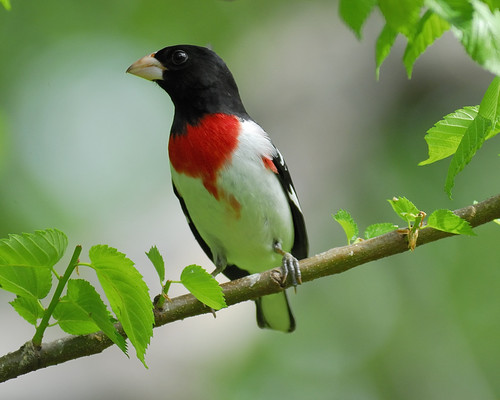tags: Rose-breasted Grosbeak, Red-breasted Grosbeak, Pheucticus ludovicianus, birds, mystery bird, bird ID quiz
[Mystery bird] Rose-Breasted Grosbeak, sometimes known as the Red-breasted Grosbeak, Pheucticus ludovicianus, photographed in Houston, Texas. [I will identify this bird for you in 48 hours]
Image: Joseph Kennedy, 12 April 2010 [larger view].
Nikon D200, Kowa 883 telescope with TSN-PZ camera eyepiece 1/200s f/8.0 at 1000.0mm iso400.
Please name at least one field mark that supports your identification.
Beginning birders: can you name the species?
Intermediate birders: can you name the bird whose song is sometimes mistaken for this species' song?
Advanced birders: can you name at least one other species that you will find breeding in the same type of habitat as this species?


Oh, this is one of my favorite birds! They nest in my Connecticut backyard and sometimes visit my feeders. I'm a singer, and I always like Peterson's apt description of this bird's singing -- like "a robin who has had voice lessons." Allegro, leggiero, e molto dolce. (Fast, flexible, and very sweet.) And may I add - this is one bird whose name describes it very precisely.
They are only migrants for me, I might get only one day of song before they continue their journey. It's as close as I get to a robin's song, too woodsy for robins. I have to make do with, as Mr. Peterson says, "a robin with a sore throat", the Tanager. These guys are only sometime migrants, I haven't seen a single one this year. The wood thrush is my only vocal comfort. rb
Red breasted grosbeaks are some of the most striking and easy to id as the field mark on the male is of course the red breast. I was birding on High Island near Galveston during the height of migration season many years ago. A strong storm had come through during the night. That morning I counted at least 30 of these little guys birds washed up on the shore -- they must have been caught in it and somehow could not make it to safety....
Interesting description, Sarah, I usually think of these guys songs as like a Robin on too much coffee -- fast, anxious, wired.
And another species might be Orchard Oriole -- I remember doing a point count in Pennsylvania with a Robin, an Orchard Oriole, and one of these all within 50 meters, and none of them would take turns singing.
I haven't the foggiest idea what it is, but it's probably not a brick. Maybe.
This was my first ever American bird, a first year male on the Isles of Scilly off the SW of the UK. No I'm not saying which year.
psweet, perhaps because I'm a soprano who likes to sing coloratura-type music (fast and high and agile), I like the Rose-Breasted Grosbeak's quick warble. The tone is sweet and clear and I love that.
One of my most meorable birding moments was about 30 years ago, on a walk through my neighborhood "patch," I came across a Rose-Breasted Grosbeak, a Scarlet Tanager, and a Baltimore Oriole **all on the same branch, within 3 feet of each other!!** allsinging away at the top of their little lungs. This was in a blossoming apple tree on a lovely May morning. I could not believe my eyes and ears! Serendipity.
the pacific northwet had one show up for two weeks in a friend's backyard... lovely bird...